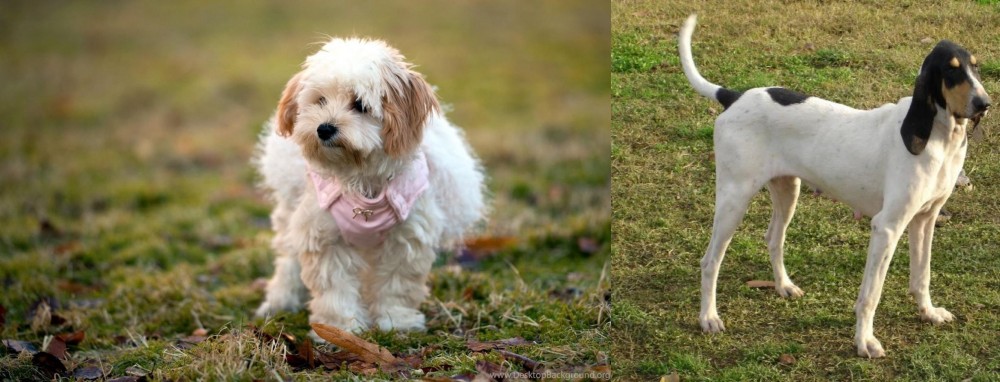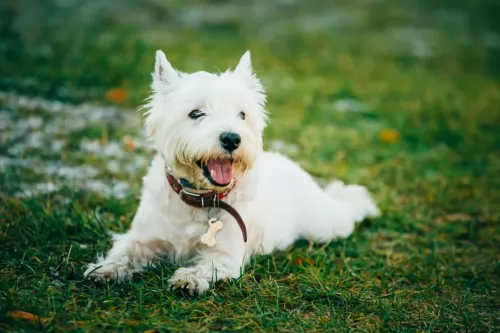 Petzlover
Petzlover West Highland White Terrier is originated from United Kingdom but Petit Gascon Saintongeois is originated from France. West Highland White Terrier may grow 32 cm / 12 inches shorter than Petit Gascon Saintongeois. West Highland White Terrier may weigh 17 kg / 37 pounds lesser than Petit Gascon Saintongeois. Both West Highland White Terrier and Petit Gascon Saintongeois has almost same life span. Both West Highland White Terrier and Petit Gascon Saintongeois has almost same litter size. West Highland White Terrier requires High Maintenance. But Petit Gascon Saintongeois requires Low Maintenance
West Highland White Terrier is originated from United Kingdom but Petit Gascon Saintongeois is originated from France. West Highland White Terrier may grow 32 cm / 12 inches shorter than Petit Gascon Saintongeois. West Highland White Terrier may weigh 17 kg / 37 pounds lesser than Petit Gascon Saintongeois. Both West Highland White Terrier and Petit Gascon Saintongeois has almost same life span. Both West Highland White Terrier and Petit Gascon Saintongeois has almost same litter size. West Highland White Terrier requires High Maintenance. But Petit Gascon Saintongeois requires Low Maintenance
 The West highland white terrier originated from Poltalloch in Scotland. So they were initially called as Poltalloch terrier and after that they were called as Roseneath terrier. They were initially used for hunting fox, badger, otter and in killing the vermin like rats.
The West highland white terrier originated from Poltalloch in Scotland. So they were initially called as Poltalloch terrier and after that they were called as Roseneath terrier. They were initially used for hunting fox, badger, otter and in killing the vermin like rats.
The breed history says that Colonel Malcolm of Poltalloch was the reason for the Westie's white colour. This is because in 19th centuryhe went for hunting with his dogs and accidentally he shot his dog as its colour was as fox. So he decided to breed only white colour dogs.
 The Petit Gascon Saintongeois comes from- and is in fact a smaller version of the Grand Gascon Saintongeois. The dog has been used for hunting. Hunters wanted a smaller dog and these were the Petit Gascon Saintongeois.
The Petit Gascon Saintongeois comes from- and is in fact a smaller version of the Grand Gascon Saintongeois. The dog has been used for hunting. Hunters wanted a smaller dog and these were the Petit Gascon Saintongeois.
There was a time when the numbers of these dogs became less and their numbers were restored by Baron Virelade in the 19th century. It is where this dog gets his nickname from.
The Petit Gascon-Saintongeois was recognized by the United Kennel Club on January 1, 1993.
 The Westie can be said as that a small dog having the talents of the big dog. They are very popular for their obedience. They are also working as therapy dogs and also some in search and rescue teams. The home having Westie will have fun always and be enthusiastic. They will suit them for country or city living, but they like to live with their family. They are well suitable for apartment living, but some training should be given to them for not barking. They can stay in home when you are at work. Westie can be taken to travel, whether it may be long vacation or a short visit.
The Westie can be said as that a small dog having the talents of the big dog. They are very popular for their obedience. They are also working as therapy dogs and also some in search and rescue teams. The home having Westie will have fun always and be enthusiastic. They will suit them for country or city living, but they like to live with their family. They are well suitable for apartment living, but some training should be given to them for not barking. They can stay in home when you are at work. Westie can be taken to travel, whether it may be long vacation or a short visit.
They are quick learners and so training them is not difficult. Mistakes of them can be corrected patiently since they don't like harsh activities against them. Westie will definitely bark when he sees something or hear different sounds. He will bark on seeing visitors or even other dogs. Sometimes they will bark for very silly things but when given appropriate training in their young stage, they can bark only for alerts.
 The Petit Gascon Saintongeois is a smaller version of the Grand Gascon Saintongeois but he is still muscled and lean and looked upon as being a large, robust dog.
The Petit Gascon Saintongeois is a smaller version of the Grand Gascon Saintongeois but he is still muscled and lean and looked upon as being a large, robust dog.
His coat is short and dense and is white with black patches and some speckles. You'll find that there are nearly always black patches found on either side of the head, surrounding the eyes and covering the ears. The ears are essentially black, although there is also some tan coloring.
The ears are floppy, the tail long and saber-shaped.The Petit Gascon Saintongeois is a well proportioned dog standing at between 56 to 62cm in height and weighing 23 to 27kg.
The Petit Gascon Saintongeois is a friendly, good-natured pet, being loyal and loving with his human family and being a good playmate to children. He is also intelligent and amicable and will be easily trained and socialized.
 The Westie is friendly with children but not all the time. So some care should be taken while they are near children.
The Westie is friendly with children but not all the time. So some care should be taken while they are near children.
They like to chase rodents like rabbits as they are interested in hunting.
They are suitable for apartment living unless they are left alone for a very long time. They love cold weather more than hot.
They can be trained by giving some extra efforts.
 Your gentle, calm, amicable Petit Gascon-Saintongeois is such an excellent hunting dog, but he doesn’t let that get in the way of him being a wonderful family pet as well.
Your gentle, calm, amicable Petit Gascon-Saintongeois is such an excellent hunting dog, but he doesn’t let that get in the way of him being a wonderful family pet as well.
His friendly, good natured, docile temperament makes this particular breed a superb choice as he gets on so well with children too if they themselves have been taught to be kind to animals and to respect them.
He is intelligent too and easy to train, and he is attractive to look at as a bonus. This all makes him the kind of pet and companion that everyone could benefit from.
 The Petit Gascon-Saintongeois has no documented breed related health problems. As previously mentioned, with his long ears, check out the inside of his ears regularly for ear infections.
The Petit Gascon-Saintongeois has no documented breed related health problems. As previously mentioned, with his long ears, check out the inside of his ears regularly for ear infections.
Ticks fleas and worms are a curse. Worms particularly are terrible internal parasites and in fact some worms can even be fatal in puppies. Some of the signs your dogs may have worms include weight loss, a dull, dry, thinning coat, no loger interested in food, diarrhea and vomiting. The best way to respond to your pet’s worm issues is to get him to the vet.
This problem is looked upon as a medical emergency. Gastric dilatation and volvulus, if left, can kill your dog. It’s when gas is trapped in the stomach which has twisted, blocking off the stomach’s blood supply.
Deep chested dogs, feeding your dog just one meal a day so that he gobbles it up too quickly, and older, obese dogs are more prone to bloat. Your dog will require immediate veterinary intervention.
 The puppy should be fed 3 to 4 times per day as it requires a considerable amount for their growth. Cooked chicken breast and turkey are best for them and also vegetables should be given to them. Beef and chicken should be kept a limit as it will lead to itchy skin and allergies.
The puppy should be fed 3 to 4 times per day as it requires a considerable amount for their growth. Cooked chicken breast and turkey are best for them and also vegetables should be given to them. Beef and chicken should be kept a limit as it will lead to itchy skin and allergies.
The preferable food for the Westie is home cooked. The home food will only contain all the essential nutrients for the Westie.
Eventhough the Westie is suitable for apartment living it is recommended to have a daily walk for him to be active and refreshing.
They should be made to play for atleast 30 minutes per day for their health as to not gain overweight. Grown up children can play with them as they like it.
 The Gascon Saintongeois is looked upon as being a fairly low maintenance breed. That is because the coat is short and smooth, although the coat does become thicker in the Winter time. He sheds so you will want to brush his coat at least twice a week.
The Gascon Saintongeois is looked upon as being a fairly low maintenance breed. That is because the coat is short and smooth, although the coat does become thicker in the Winter time. He sheds so you will want to brush his coat at least twice a week.
With his long floppy ears, during your brushing session, check inside his ears as dampness, wax and debris can become the ideal breeding spot for bacteria, and ear infections can be the result. Check for redness and possible discharge.
Check his eyes that they are clear and bright.
While brushing him, check for any new, unusual lumps.
Keep his nails well trimmed.
Provide him with a nice warm, dry spot to sleep.
When he’s oudoors, make sure that he has both sun and shade and that his waterbowl is always available.
Make sure that at the first signs of illness you get your pet to the vet.
Feed him only the best quality kibble there is. Occasionally give him some home-made food. Keep this food simple and nutritious. You can’t go wrong with boiled chicken, brown rice or pasta, sweet potatoes, carrots and spinach. You can chop this up and add it to his kibble. Sometimes it can benefit your pet to include some raw meat as well.
If only pet owners would realize that their pets don’t want all those spicy, exotic people foods. They just give a dog a stomach ache and eventually shorten his life. Make sure he always has access to a bowl of cool, fresh water.